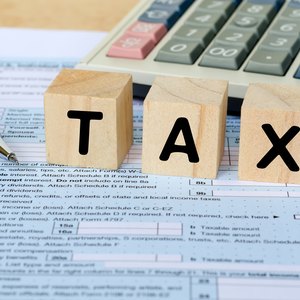
The IRS explains federal taxes as a "pay as you go" plan. As you earn income throughout the year, your employer withholds payments toward your year-end tax liability. If these withholding payments vary, it might be because your income fluctuates, you receive commissions in addition to your regular salary or because you modified the number of allowances you claim.
Fluctuations in Income
If you're an hourly wage earner, your income may vary each pay period because the numbers of hours you work also varies. Since your federal withholding payments are based on your income, the amount that your employer withholds will also vary, depending on changes to your income. If you are a salaried employee, your federal withholding payments may also fluctuate if you experience raises, pay cuts or other adjustments to your rate of pay.
Exploring Supplemental Wages
The IRS defines supplemental wages as any payments made to an employee that are not "regular wages" including overtime pay, commissions, bonuses, back pay, awards and accumulated sick leave payments. As long as your supplemental wages total less than 1 million dollars, your employer may include your supplemental wages in your regular paychecks, taxed as a single amount based on the sum of regular wages plus supplemental wages. They can also include them in separate paychecks, taxed at a flat rate of 22 percent.
If you infrequently receive supplemental wages, such as a year-end bonus or one-time award, your salary throughout the year may remain consistent until the one paycheck that includes the increased wages. In that scenario, your federal withholding may not vary widely among your regular paychecks throughout the year. But if you're a commissioned employee, your income typically varies from paycheck to paycheck and so will your federal withholding payments.
Understanding Your Allowances
Your federal withholding varies depending on the number of allowances you claim on form W-4, the Employee's Withholding Allowance Certificate. The more allowances you claim, the lower your tax liability becomes. However, if you claim fewer allowances on your W-4 more tax will be withheld, entitling you to a larger refund at the end of the year.
If you need to change your number of allowances because of a personal or financial situation, you may submit an amended W-4 to your employer. For example, the number of dependents you can legally claim may have increased or decreased due to marriage, divorce or the addition of a "qualifying person" as defined in IRS Publication 501, Exemptions, Standard Deduction, and Filing Information. Each time you submit an amended W-4 to your employer, your subsequent paychecks will reflect the change in your federal withholding payments.
References
- IRS: Pay As You Go, So You Won't Owe
- IRS: Publication 15 - Employer's Tax Guide
- IRS: Form W-4 Employee's Withholding Allowance Certificate
- IRS: Publication 501 - Exemptions, Standard Deduction, and Filing Information
- Intuit TurboTax:Ways to Increase Your Tax Refund You Never Thought About
- Internal Revenue Service. "Topic No. 753 Form W-4 – Employee's Withholding Certificate." Accessed Sept. 22, 2020.
Writer Bio
Victoria Lee Blackstone was formerly with Freddie Mac’s mortgage acquisition department, where she funded multi-million-dollar loan pools for primary lending institutions, worked on a mortgage fraud task force and wrote the convertible ARM section of the company’s policies and procedures manual. Currently, Blackstone is a professional writer with expertise in the fields of mortgage, finance, budgeting and tax. She is the author of more than 2,000 published works for newspapers, magazines, online publications and individual clients.
